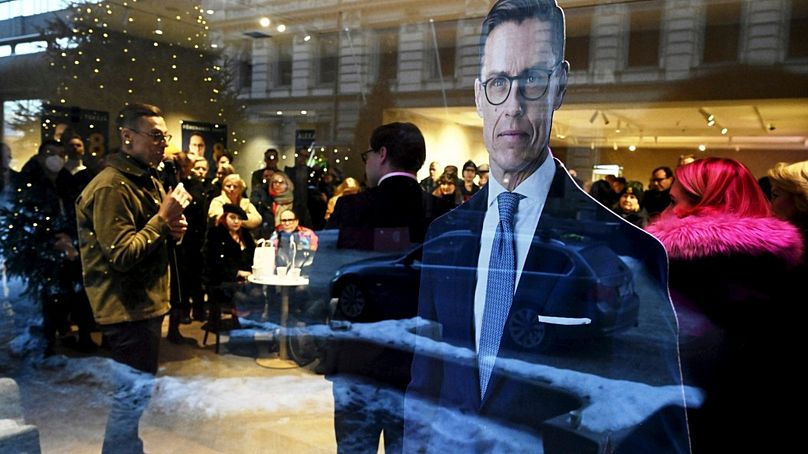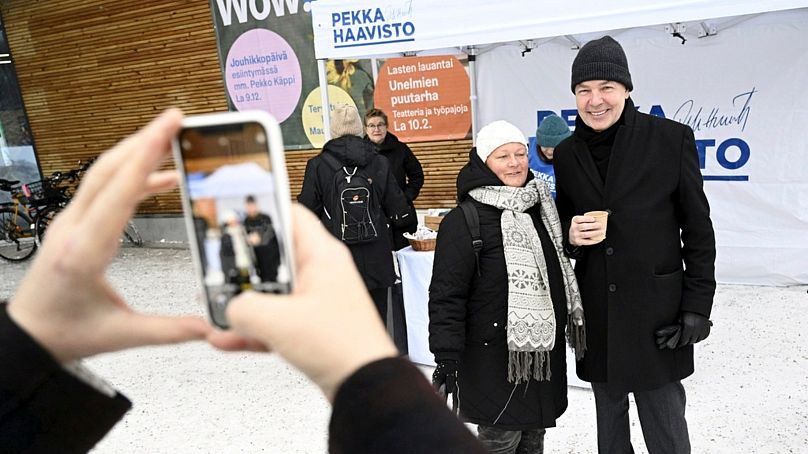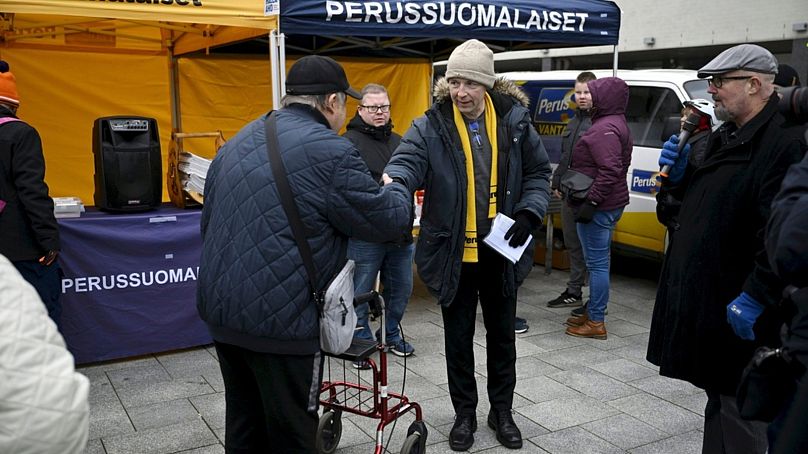The two leading contenders represent the left and right-wing of the Finnish political spectrum and are separated by just three percentage points as advance polling stations open.
Finns head to the polls this week with advance voting open in the presidential election, while the main ballot takes place at the end of the month.
 ADVERTISEMENT
ADVERTISEMENT
 ADVERTISEMENT
ADVERTISEMENT
Voting patterns suggest a third of voters at home and abroad could cast their ballots ahead of 28 January, with Finns overseas also eligible to vote during this period.
From a field of nine candidates, two have emerged as clear favourites to go through to a second round of voting in mid-February, although a late surge from the far-right candidate could still be a surprise upset.
Two former foreign ministers, Alex Stubb from the ruling right-wing National Coalition Party (known locally as Kokoomus) and Pekka Haavisto, a Green politician, have been clearly ahead of the field in opinion polls in a long campaign that has seen the candidates face scrutiny on everything from their foreign policy chops to favourite music, books, food, what cars they drive, and their pets' social media posts.
The latest polling shows Stubb and Haavisto within three percentage points of each other.
The role of the president in Finland is one of the few in Europe both directly elected and not largely ceremonial - unlike Italy, Germany, Estonia or Poland, for example. The position also comes with constitutional responsibility for foreign policy outside of the EU, and the office-holder is commander-in-chief of the Finnish defence forces.
But the president cannot act unilaterally: he or she must work in cooperation with the government of the day during their six-year term as Finland's head of state.
The office took on greater importance under incumbent Sauli Niinistö, as Finland moved to cement its decades-long alignment with NATO and formally join the military alliance.
Alex Stubb represents the right
Alex Stubb, a US-educated former Finnish PM and foreign minister, has been out of frontline politics for the last seven years: first working at the European Investment Bank in Luxembourg, and then at a university in Italy.
That absence may have shielded him somewhat from the travails of Finnish domestic political dramas: his party Kokoomus has formed a coalition government with the far-right Finns Party, which has been dogged with controversies over racism, support for ethno-nationalist conspiracy theories and links to neo-Nazi groups since taking power last summer.
Although Stubb has so far remained above the government fray, he still attracts support from far-right voters who would prefer him in the presidential palace than his liberal, Green, gay opponent.
"Voters would get an internationally very well-connected and politically experienced president with vast knowledge of European Union and European politics," with Alex Stubb, says Jenny Karimäki, a political scientist at the University of Helsinki.
Multilingual Stubb has been fervently pro-European throughout his political career and supported NATO membership long before it was fashionable to do so. But questions have been raised about his 'likeability' factor especially as his party is traditionally seen as the party of Finland's rich - and his Swedish-Finnish background, elite education, penchant for designer suits and sometimes brusque attitude can rub working-class Finns up the wrong way.
Stubb's campaign said he was too busy to answer questions sent in advance by Euronews.
Pekka Haavisto represents the left
This is Pekka Haavisto's third crack at becoming Finland's president, he came second in the last two elections behind Sauli Niinistö.
Europe's first openly gay cabinet minister, Haavisto has been with his partner for more than 20 years, a trailblazer for LGBTQ representation at the highest levels of politics: leading his party, and working as a United Nations envoy.
"Voters would get a president that held a key position as foreign secretary during Finland's NATO process and thus, has cutting edge knowledge in the fields of foreign and security policy as well as a background and experience as a peace negotiator in Global South," explains Jenny Karimäki from the University of Helsinki.
Haavisto tells Euronews there's a feeling of "positive momentum" in his campaign, as he tours the country in a new campaign bus.
"People are very eager to discuss national security. There is a lot of enthusiasm in the air," he adds.
Seemingly able to deflect potential scandals with ease during his time at the foreign ministry, Haavisto has nonetheless been criticised for being a difficult manager, and for his handling of the scheme to bring back Finnish nationals married to ISIS fighters, and their children, who were stranded at a refugee camp in Syria.
Haavisto might also have gone too far in trying to appeal as an everyman candidate, while alienating some on the left. In a strategy to attract voters from the centre and soft-right, Haavisto declared he wasn't a "red" candidate. He brushed off that misstep, telling Euronews that "party affiliations are not at the forefront" of this campaign.
"Haavisto's track record and his managing skills and style have been under evaluation in the Finnish media," adds Helsinki University's Jenny Karimäki.
Seven other candidates in a crowded race
There are seven other candidates in the race but so far none of them has seemed to break through nationally.
The leader of the Left Alliance party Li Andersson is considered one of the brightest politicians of her generation but still her polling hovers in the mid-single digits.
Jutta Urpilainen, on leave from her job as Finland's EU Commissioner, only jumped into the race belatedly, and somewhat half-heartedly, at the end of last year but has failed to gain any real traction for the Social Democrats.
The Christian Democrats' Sari Essayah, a former MEP and 1993's 10,000 metre speedwalking World Champion is on her second presidential campaign and still polling around 1% - 2%; while Hjallis Harkimo, a millionaire reality TV show star who started his own Movement Now political party finds himself languishing there similarly.
The Centre Party's Olli Rehn, another former EU Commissioner and currently Chairman of the Bank of Finland has run a solid campaign, and looks 'presidential' in his appearances, but his party's national fortunes have been in the doldrums since the last general election and this will almost certainly reflect on him: Rehn will be lucky to get more than 10% of the vote in the first round.
Mika Aaltola, an independent candidate with a background in foreign policy, has seen his poll numbers drop like a stone from being one of the front-runners a year ago to low single digits now. A lack of party infrastructure to support his campaigning, and lack of prior political experience, have proved to be the weak points in his presidential bid.
The candidate of the far-right Finns Party, Jussi Halla-aho has attempted to fire the campaign with increasingly populist rhetoric: he's filed police reports against a Green politician and a comedian for calling him a "fascist"; and he's also said that Members of Parliament and government ministers should be native-born Finns without a foreign background, something that has been criticised as unconstitutional.
But could he make a late, populist surge, and get into the second round of voting?
"To my knowledge Halla-aho's support comes mainly from the Finns Party supporters and he has not been able to attract support across the party spectrum," says Jenny Karimäki from the University of Helsinki.
"Finns Party support is at around 17% and should he be able to convince all of them it might be a tight race but to do that Halla-aho would have to win back all those Finns Party supporters currently supporting Alexander Stubb," she explains.
"Thus far, Halla-aho's campaign has not, however, revealed anything particularly new aspects of him and his politics that would turn the table in his favour vis-a-vis Stubb."













